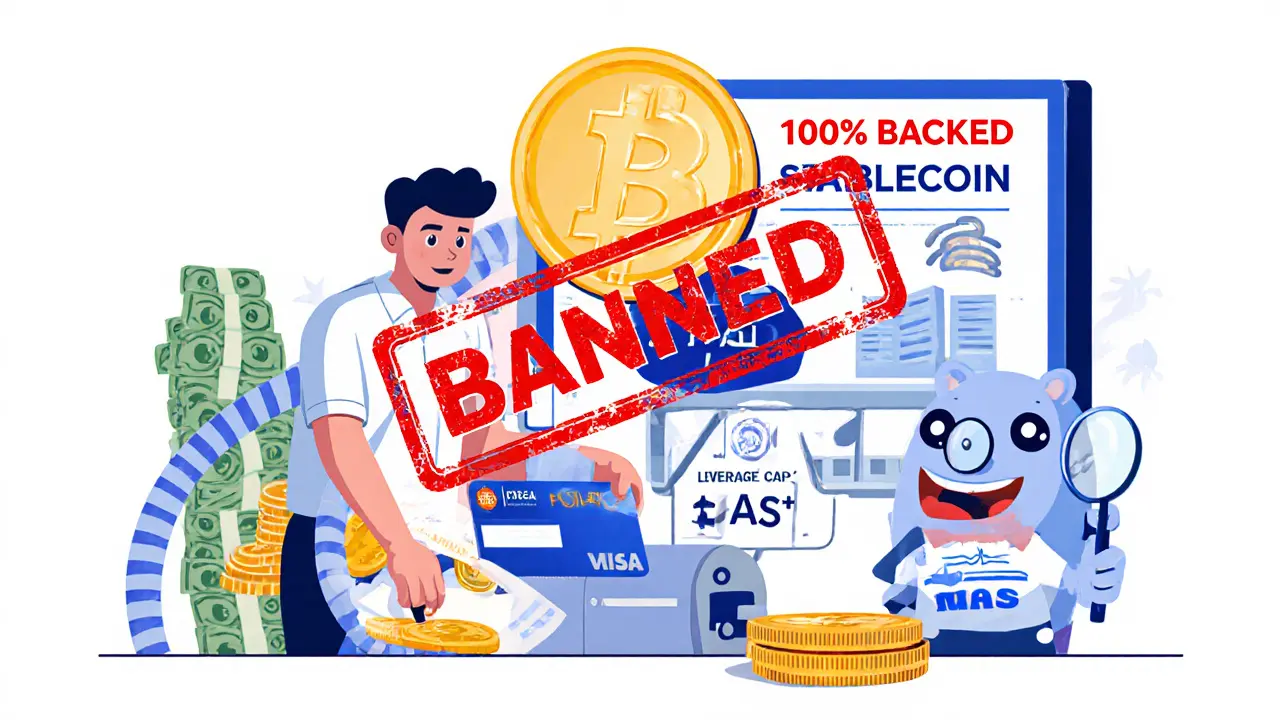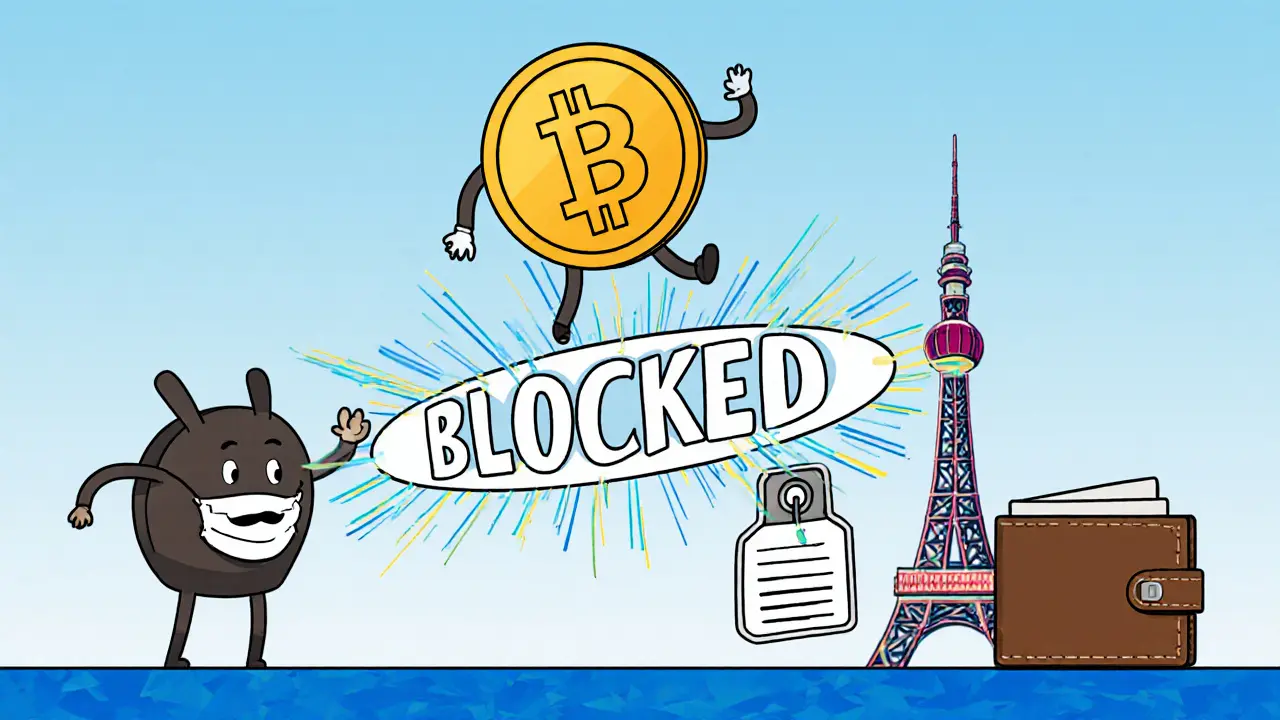Singapore Crypto License Calculator
Determine Your Required License Type
Based on Singapore's 2025 regulations, select your business type and transaction volume to see which license you need.
By June 30, 2025, if you were running a crypto exchange, wallet service, or token trading platform from Singapore-even if you only served customers overseas-you had to shut down or get licensed. There were no extensions. No grace periods. The Monetary Authority of Singapore (MAS) didn’t ask nicely. It enforced the law. And now, only those who cleared the strictest hurdles in the world’s most sophisticated crypto regulatory framework are still operating.
How Singapore Turned Crypto into a Regulated Asset Class
Singapore didn’t wait for crypto to explode. It didn’t panic when Bitcoin hit $60,000 or when TerraUSD collapsed. It built a system. Back in 2020, the Payment Services Act (PSA) came into force, and suddenly, every crypto business in Singapore had to register. Digital payment tokens (DPTs)-that’s what MAS calls Bitcoin and Ethereum-were no longer a gray area. They were financial instruments. And anyone handling them needed a license.The PSA didn’t just slap on rules. It created structure. It split crypto operators into three buckets based on how much money they moved. Small players? A Standard Payment Institution License. Big players? A Major Payment Institution License. And if you barely touched crypto? You might qualify for Exempt Payment Service status-but even then, you had to report to MAS.
Then came the twist: in May 2020, MAS ruled that if your token looked like a security-offering profit-sharing, voting rights, or investment returns-it wasn’t a DPT anymore. It was a capital market product. That meant you needed a Capital Markets Services (CMS) license. No more pretending your token was just a “utility.” If it acted like a stock, it was regulated like one.
The 2025 Revolution: FSMA and the End of Loopholes
The real game-changer came on June 30, 2025, with the full rollout of the Financial Services and Markets Act 2022 (FSMA). This wasn’t an update. It was a reset.Before FSMA, some firms thought they could operate from Singapore but serve only foreign clients. They didn’t need a license, they claimed. MAS said: wrong. Under FSMA, anyone providing digital token services from Singapore-regardless of where their customers live-must be licensed. That includes offshore exchanges, decentralized protocols with Singapore-based developers, and even crypto consultants running trading bots from their homes in Sentosa.
The licensing bar was raised dramatically. Minimum capital? $250,000 SGD for major operators. You need a full-time compliance officer based in Singapore. You need annual audits by a MAS-approved firm. You need cybersecurity systems that meet international standards. And you need to prove you’re not just a shell company.
Unlicensed firms? They were shut down. No warnings. No fines to pay and keep going. Just a hard stop. By July 1, 2025, only 17 firms held valid licenses under the new regime. That’s down from over 100 in 2024. The message was clear: Singapore doesn’t want more crypto companies. It wants better ones.
Anti-Money Laundering: The Crypto Travel Rule in Action
If you think AML rules are just for banks, think again. MAS Notice PSN02-the Crypto Travel Rule-is one of the toughest in the world. It forces every licensed crypto platform to collect and share customer data on every transaction over $1,000 SGD.That means when you send ETH from a Singapore exchange to a wallet in Tokyo, the exchange must send the sender’s name, ID number, and address to the receiving platform. If the receiving platform isn’t licensed? The transaction gets blocked. No exceptions.
This isn’t optional. Platforms that fail to implement real-time transaction monitoring face license suspension. MAS doesn’t just check paperwork. They run test transactions. They see if your system flags suspicious behavior-like a user sending small amounts to 20 different wallets every hour. If your system misses it, you’re in trouble.
And it’s not just about big transfers. Even small, frequent transactions are tracked. If you’re a retail user in Singapore buying crypto with your debit card, you’re not anonymous. Your identity is tied to every trade. That’s the trade-off: privacy for protection.

What’s Banned-and Why
Singapore doesn’t just regulate. It restricts. In 2025, MAS banned credit card purchases of crypto. No more using your Visa to buy Bitcoin on a whim. Why? Because retail investors were taking on too much debt chasing gains. MAS saw people maxing out cards on Dogecoin and ending up with debt and losses. The ban wasn’t about stopping innovation-it was about stopping recklessness.There’s also a hard cap on leverage. No platform can offer more than 5:1 leverage on crypto trading. That’s lower than what’s allowed in forex. And for stablecoins? Issuers must hold 100% backing in cash or short-term government bonds. No algorithmic magic. No unbacked tokens. If you issue a USD-pegged stablecoin in Singapore, you must prove you have the dollars to cover every coin in circulation.
Even marketing got tighter. Crypto ads can’t use phrases like “guaranteed returns” or “get rich quick.” They can’t show influencers flashing luxury cars bought with crypto. MAS cracked down on hype. The goal? Make crypto look like investing, not gambling.
Stablecoins and the Future of Digital Assets
While other countries debate whether stablecoins are a threat or a tool, Singapore moved fast. In early 2025, it released its official stablecoin framework. Issuers must now be licensed, audited quarterly, and hold reserves in approved currencies. No Tether-style opacity. No Terra-style collapse.And it’s working. By October 2025, three stablecoins were fully licensed in Singapore: one issued by a global bank, one by a Singapore fintech, and one by a consortium of Asian insurers. All are backed by real assets. All are redeemable on demand. All are audited by Big Four firms.
This isn’t just about control. It’s about opportunity. Singapore is positioning itself as the home for institutional-grade digital assets. Hedge funds, asset managers, and pension funds from Europe and North America are now using Singapore-licensed platforms to access crypto-because they know the rules won’t change tomorrow.

How Singapore Compares to the Rest of the World
Hong Kong is catching up, but it’s still drafting rules. The EU’s MiCAR is full of gray areas and transitional periods. The U.S. is stuck in political gridlock, with the SEC suing exchanges one week and Congress proposing a new bill the next.Singapore? It’s done. The rules are final. The licenses are issued. The penalties are clear. That’s why global firms like Coinbase, Binance (after restructuring its regional HQ), and Kraken moved their Asia-Pacific operations to Singapore-not because it’s cheap, but because it’s predictable.
Even crypto-native companies that once hated regulation now admit: Singapore’s framework gives them stability. They can raise capital. They can partner with banks. They can hire talent without fearing a sudden crackdown.
What This Means for You
If you’re a trader in Singapore: your crypto is safe. Your exchange is regulated. Your money isn’t sitting on a platform that could vanish overnight.If you’re a business owner: you’ve got a clear path to licensing-but it’s expensive and slow. You need legal help, compliance staff, and real capital. No shortcuts.
If you’re an investor: you’re protected. No unbacked tokens. No leverage traps. No hype-driven pumps. You still take risks-but you’re not being misled.
Singapore didn’t ban crypto. It cleaned it up. It turned chaos into structure. And in doing so, it made itself the most trustworthy place in Asia to do crypto business.
Is crypto legal in Singapore?
Yes, crypto is legal in Singapore-but only if you’re using a licensed platform. Bitcoin and Ethereum are recognized as digital payment tokens under the Payment Services Act. You can buy, sell, and hold them. But you can’t use unlicensed exchanges, and you can’t use credit cards to buy them. All trading must go through MAS-approved providers.
Do I need a license to trade crypto in Singapore?
No, individual traders don’t need a license. You can buy and sell crypto as a retail investor. But the platform you use must be licensed by MAS. If you’re running a business that exchanges, stores, or issues crypto tokens, then yes-you need a license. That includes exchanges, wallet providers, and stablecoin issuers.
What happens if I use an unlicensed crypto platform in Singapore?
You won’t be arrested. But your funds could be at risk. Unlicensed platforms are shut down by MAS. If the platform gets frozen or disappears, you have no legal recourse. Singapore’s regulators don’t protect users of illegal platforms-they protect the financial system. Always check the MAS website for the official list of licensed providers.
Can I use Binance in Singapore?
The global Binance platform is not licensed in Singapore. However, Binance has a separate legal entity called Binance Singapore Pte. Ltd., which is licensed under the Payment Services Act. Only this entity is allowed to operate in Singapore. Make sure you’re using the Singapore domain (.sg) and not the global site. Transactions on the global site are not protected under Singapore law.
Are stablecoins regulated in Singapore?
Yes. Since early 2025, all stablecoins issued or traded in Singapore must be backed 100% by cash or short-term government bonds. Issuers must be licensed, audited quarterly, and allow immediate redemption. Algorithmic or crypto-backed stablecoins (like the old TerraUSD) are banned. Only fully collateralized, transparent stablecoins are permitted.
What’s the difference between a Standard and Major Payment Institution License?
The Standard License is for smaller operators handling up to SGD 3 million in monthly transactions. It requires $100,000 SGD in capital. The Major License is for larger firms exceeding that threshold and requires $250,000 SGD in capital. Major License holders face stricter audits, more detailed reporting, and mandatory Singapore-based compliance officers. Most large exchanges hold the Major License.
Can I start a crypto business in Singapore today?
Yes-but it’s extremely difficult. The MAS has stopped issuing new licenses under the FSMA unless the applicant demonstrates exceptional compliance capabilities, proven track record, and full operational readiness. The window for new entrants is effectively closed. Only established firms with strong backing and compliance infrastructure are being approved. For most startups, the path is now through partnerships with licensed entities, not direct licensing.
